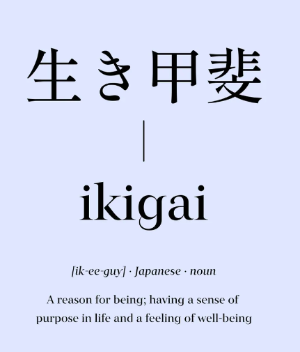
Blue Zone Pillar for Long Life #3: Positive Outlook
Nurturing a Positive Outlook: Your Path to a Longer, Healthier Life
In our pursuit of a fulfilling and enhanced quality of life, it's essential to focus on more than just physical health. The Blue Zones, regions around the world where people live exceptionally long and healthy lives, offer valuable insights into the lifestyle factors that contribute to longevity. One such factor is a positive outlook, which encompasses three key elements: purpose (ikigai), unwinding or de-stressing regularly and faith.
1. Purpose (Ikigai): Your Reason for Being
 Ikigai, a Japanese concept, refers to one's reason for being. It is both the things in your day-to-day existence that make your life worth living and the way engaging in these things makes you feel. In our modern, career centered culture, we often place too much weight on finding our purpose through our careers, roles and professional skills. The spirit of ikigai is more of a spectrum from very small things in life that bring joy to life defining goals and passions. For example, ikigai can encompass fully enjoying your early morning reflection time with a cup of tea, to your dedication to loving your grandchildren, to running a non-profit organization that fights for social justice.
Ikigai, a Japanese concept, refers to one's reason for being. It is both the things in your day-to-day existence that make your life worth living and the way engaging in these things makes you feel. In our modern, career centered culture, we often place too much weight on finding our purpose through our careers, roles and professional skills. The spirit of ikigai is more of a spectrum from very small things in life that bring joy to life defining goals and passions. For example, ikigai can encompass fully enjoying your early morning reflection time with a cup of tea, to your dedication to loving your grandchildren, to running a non-profit organization that fights for social justice.
Finding and living your ikigai can provide a sense of purpose, motivation, and social engagement, which enhances your quality of life, health, energy and place in the world.
Questions to Explore Your Ikigai:
- What things in your day-to-day existence make your life worth living?
- What activities or hobbies bring you enjoyment or cause you to lose track of time?
- What ways do you enjoy helping or supporting others?
- What is the reason you get up in the morning?
- What are the things you value the most?
- What are the small things that give you pleasure?
2. Unwind Regularly
People in the Blue Zones also experience stress. They have experienced challenging historical times, they work hard and well past the typical retirement age, but they find time to decompress every day. Stress can lead to chronic inflammation, associated with every major age-related disease and the world’s longest-lived people have regular routines to shed that stress and prioritize relaxation. Okinawans take a few moments each day to remember their ancestors, Adventists pray, Ikarians take a nap and Sardinians do happy hour.
Rather than de-stressing by sitting on a couch, tuning out to Netflix or doom-scrolling, turn to one of these options to foster healthy connection and decompression.
Ways to Unwind:
- Spend time with those you care about and enjoy. Laugh, dance, walk, and share meals or activities with others. Healthy social connections deeply wire in the experience of safety and offload stress.
- Active relaxation: Take time to consciously relax your body, rest and be in the moment to reduce anxiety. Explore the many free guided progressive relaxation or body scans available on You Tube to experience how this can support you during high stress times. These practices significantly support sleep quality which improves overall health.
- Unplug: Set boundaries with your technology, news and social media. Take a break from being stimulated and being “on” in order to tune into how you are doing and what you need to off load the buildup of stress every day.
- Yoga, walking and movement: Find gentle physical activities that promote the experience of being present in your body, breath and surroundings, to naturally activate your relaxation response.
- Spend time in nature: Connect with the natural world to gain perspective, reduce stress and boost mood.
3. Faith: Finding Meaning and Connection
Regardless of their denomination, people in the blue zones tend to belong to faith-based communities and devote time towards their respective communities. Faith, whether religious or spiritual, can provide a sense of meaning, hope, and connection to something larger than oneself. Studies have shown that people who are spiritually connected tend to have better mental and physical health.
Ways to Foster Your Faith:
- Take time to explore what faith means to you: Give yourself permission to explore different traditions of faith to see what fits at this phase of your life.
- Many people are drawn to organized spiritual or church groups and this is a healthy way to engage in their community and faith traditions.
- Many do not feel drawn to organized religion or groups, but benefit from their own personal relationship with faith and spirituality. Meditation, yoga and mindfulness practices can be powerful practices for many to connect to a sense of a higher power.
- Find regular practices or traditions to that nurture your faith: Meditate, pray, sing, chant, or attend community, spiritual or religious services that resonate with you and support you and connect you with others.
- Volunteer your time: If faith traditions do not resonate for you, explore giving back to your community in some way. Focusing on helping others can help to improve social engagement, a sense of belonging and reap rewards of mental and physical health.
By actively nurturing a positive outlook and embracing these three key elements of the blue zones lifestyle, you can have a healthy impact on your overall well-being, living a longer, healthier, and more meaningful life. Remember, even small steps can lead to big changes over your lifespan. Start by adding one of these practices into your daily routine and experience the transformative power of cultivating a positive outlook.






